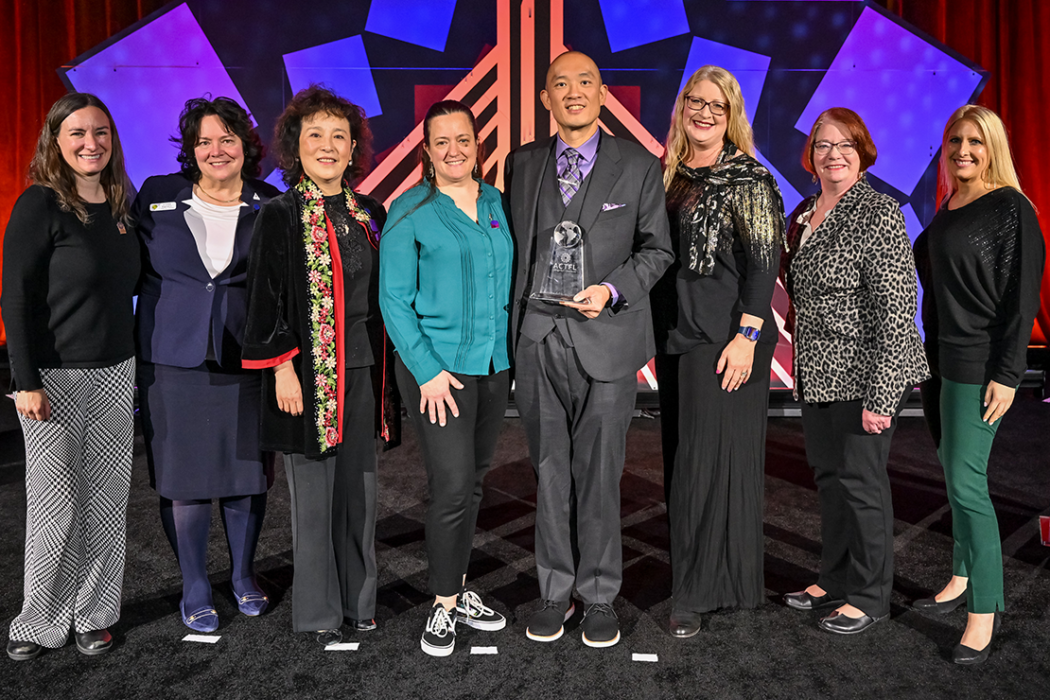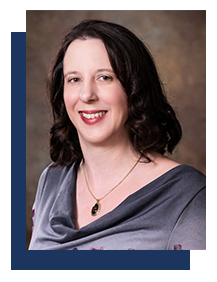Catherine Ousselin

2018 Hall of Fame Nominee

Mount Vernon High School
Mount Vernon, WA
2018 Finalist from PNCFL
French
As a graduate student and in my first teaching position, I knew very little about professional organizations for World Language teachers. My departments did not require or encourage membership, nor did they offer support to attend conferences. In 2003, however, my level of professional engagement changed dramatically when, due to the encouragement of an active member, I submitted my first conference proposal for the American Association of Teachers of French. My presentation was on Teaching Reading Proficiency through Storytelling (TPRS) with the medieval poem, Le Frêne. It was my second year of teaching at the high school level and my first presentation. My anxiety as high as there was only a weak projector sitting a chair that barely projected onto to the screen. However, the participants in the session put my fears to rest as we began acting out the story and discussing further options for the unit. I was one of the youngest teachers at this conference, but the veteran teachers treated me as an equal. They invited me to other sessions and small-group discussions, and for first time at the high school level, I felt connected to professionals in my content area. The fact that I had a network of teachers with whom I could discuss units, strategies, and concerns via email, newsletters, and in my region supported me through the initial five years of teaching. I repaid the encouragement of my colleague by inviting other teachers in my region to participate in the AATF and attend the conferences. It was my first form of advocacy.
In 2007, I took a position in a different school. The former teacher was highly active in the AATF and our local state organization, WAFLT. At this school, attending the state language conference was expected and paid for by the school. A major difference from my previous school as I had not even heard about WAFLT from the department chair or administration. It was an impressive conference that opened the doors to a wider variety of teaching practices and philosophies. At the 2009 spring regional, I presented my first “Thinking About Syncing?” workshop on using thoughtful technology tools in World Language. Since 2007, I have become a dedicated attendee and presenter at local and national conferences on technology for World Language, current methodologies, and unit design. I belong to seven professional organizations and serve as a mentor, curator, advocate, and leader. Each role that I have served for these organizations not only helps the members, but supports me as a professional who is able to communicate that level of professionalism to her students, administration, and community. Participation has taught me to consider and adapt to the realities of others who may not have my technological experience, access to the resources or academic freedom that I have. I use the social media platforms of which I am the manager and my own account to advocate for World Language education and professional involvement. The online community of educators has grown exponentially in the past few years, and I believe if harnessed correctly, can lead to more active members in our language organizations. My voice as a leader has strengthened, and I feel more confident in my pedagogical knowledge and practices. However, professional involvement is not only about presenting and leading, it is mainly about collaborating and learning from others in order to support student learning.
The teaching philosophies and practices that I have learned through interacting with a wide variety of World Language educators at the local and national level have directly impacted our French program’s growth and student success. When I began at Mount Vernon High School, there were 80 students in French 1 and 2. Within two years, we had 180 students and after the fourth year, we hired another French teacher. We now have over 350 students and two full-time French teachers. The message has spread around our district: French is a fun, but meaningful class where everyone can progress at a comfortable pace towards obtainable and personalized goals.
Each conference that I attended connects me with teacher leaders and role models who not only shared their practices and units, but also listened to new ideas from attendees. Using best practices such as World-Readiness Standards, Backward Unit Design, and IPAs support student growth in their speaking, writing, and listening, and reading skills. The students are engaged in meaningful activities that supported their path to proficiency through units that connect with their interests and future uses of the language. I have learned how to design a classroom environment and curriculum that accommodates as many learner types as possible using what others have shared and modeled. Tasks are authentic and purposeful for my students. I am a bit rebellious to the traditional topics in that I don’t teach the “Going to the doctor unit” or the “Eating a café” skit because the majority of my students will not experience these settings. We focus on using the language to express our opinions on the quality of our school lunch versus lunches around the world, the right for all children to receive a quality education, and the qualities of a thoughtful world explorer. These units focus on topics that encourage and empower the students to read, speak, and connect with the language in a variety of modes. I provide them with functional chunks that allow them to create with the language that they have and experiment with new ideas. Our units are not based on grammar, but is embedded within the chunks and the resources, both authentic and teacher-created. Thus, students are able to communicate in the language from year one. Assessments are not punitive – they offer a snapshot of each student’s progress towards the unit benchmarks and can be redone for demonstration of growth or mastery. Students may choose reading and listening tasks that best demonstrate their current proficiency level. French is used for instruction nearly 90% of the class period, and students use the language for interpersonal, interpretive, and presentational tasks.
My journey on the path of professional growth through participation in local and national organizations began with one colleague encouraging me to present an idea that I thought worked well in my classes. One connection to another educator will guide and support an educator through the highs and lows of teaching. It is my goal to connect with as many educators as possible so that we may enrich our professional experiences and the educational experiences of our students.